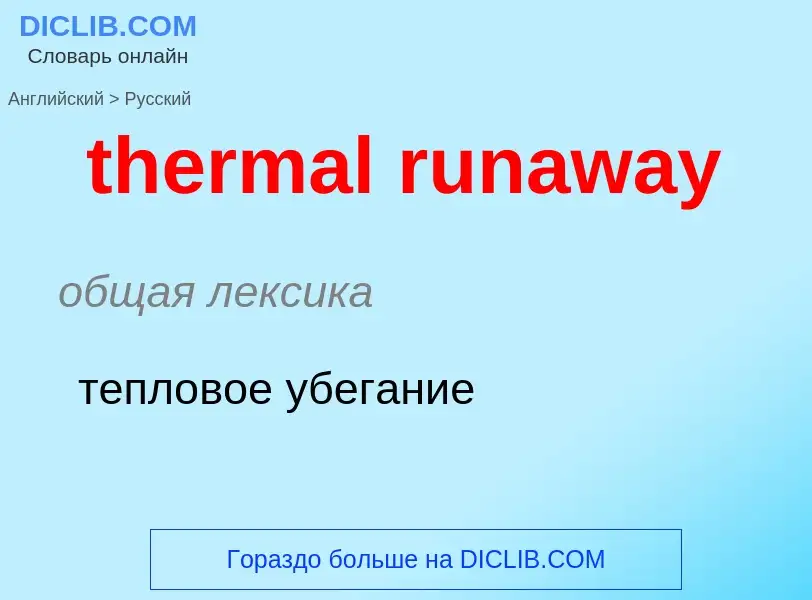Translation and analysis of words by ChatGPT artificial intelligence
On this page you can get a detailed analysis of a word or phrase, produced by the best artificial intelligence technology to date:
- how the word is used
- frequency of use
- it is used more often in oral or written speech
- word translation options
- usage examples (several phrases with translation)
- etymology
thermal runaway - translation to russian
общая лексика
тепловое убегание
['rʌnəwei]
общая лексика
взлетно-посадочная полоса
неконтролируемый
Смотрите также
прилагательное
общая лексика
убежавший
беглый
понёсший (о лошади)
лёгкий
доставшийся без труда
неудержимый
быстро растущий
потерявший управление
вышедший из-под контроля (о механизме и т. п.)
понесший (о лошади)
неудержимый, быстро растущий
легкий, доставшийся легко
существительное
['rʌnəwei]
общая лексика
беглец
дезертир
лошадь
которая понесла
побег (особ. жениха с невестой)
легко доставшаяся победа
лошадь, несущаяся закусив удила
побег
стремительный, неудержимый рост
физика
разгон
неуправляемое возрастание мощности
выход из-под контроля (реактора)
астрономия
убегание
авиация
взлётно-посадочная полоса
общая лексика
разносный
выход из под контроля
Wikipedia

Thermal runaway describes a process that is accelerated by increased temperature, in turn releasing energy that further increases temperature. Thermal runaway occurs in situations where an increase in temperature changes the conditions in a way that causes a further increase in temperature, often leading to a destructive result. It is a kind of uncontrolled positive feedback.
In chemistry (and chemical engineering), thermal runaway is associated with strongly exothermic reactions that are accelerated by temperature rise. In electrical engineering, thermal runaway is typically associated with increased current flow and power dissipation. Thermal runaway can occur in civil engineering, notably when the heat released by large amounts of curing concrete is not controlled. In astrophysics, runaway nuclear fusion reactions in stars can lead to nova and several types of supernova explosions, and also occur as a less dramatic event in the normal evolution of solar-mass stars, the "helium flash".
Some climate researchers have postulated that a global average temperature increase of 3–4 degrees Celsius above the preindustrial baseline could lead to a further unchecked increase in surface temperatures. For example, releases of methane, a greenhouse gas more potent than CO2, from wetlands, melting permafrost and continental margin seabed clathrate deposits could be subject to positive feedback.



